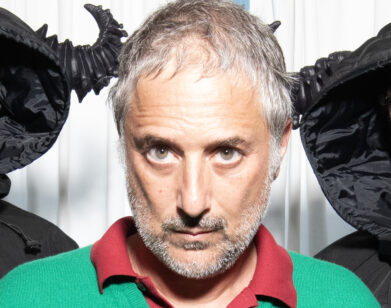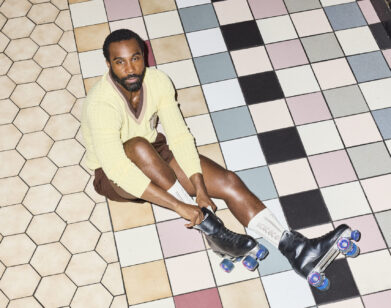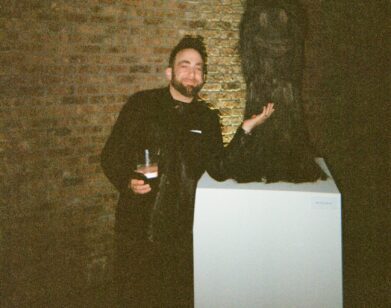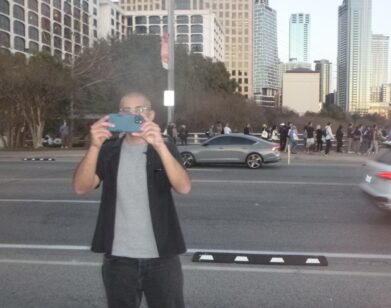The Politics of Gael GarcÃa Bernal
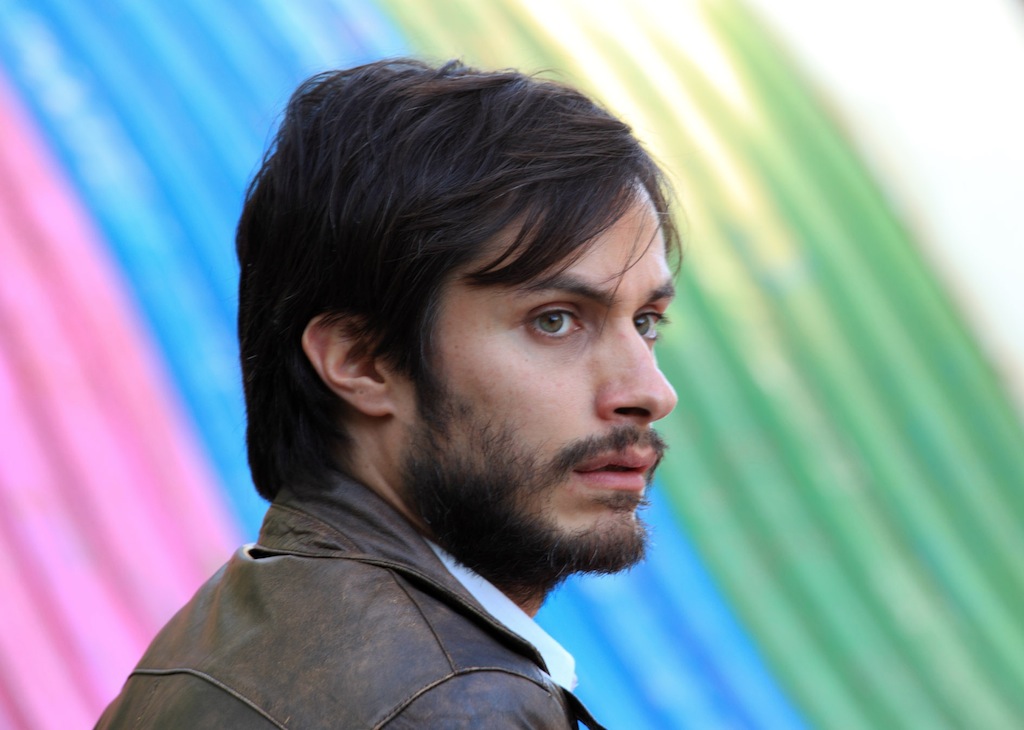
ABOVE: GAEL GARCÍA BERNAL IN NO. PHOTO COURTESY OF TOMAS DITTBURN
In 1990, Chile peacefully deposed its dictator of 17 years, Augusto Pinochet. Pinochet’s reign was not peaceful: dissidents disappeared and potential political opponents were killed or fled into exile. Unlike other Latin American dictators, such as Cuba’s Batista in 1959 or Nicaragua’s Anstasio Somoza in 1980, Pinochet was not overthrown in a bloody coup led by a charismatic opponent, but by an idea, a slogan: “Happiness is coming.”
Concerned about Chile’s international image and facing increasing pressure from Western governments, Pinochet agreed to hold a referendum in 1988. Chileans could vote “yes”—legitimizing Pinochet’s position—or “no”—calling for the dictator to step down. Campaigns for both the “No” and the “Yes” factions were permitted 15 minutes each day to argue their case on national television. For the first time, Pinochet’s opponents could voice their discontentment publicly.
Shot on grainy 1980s videotape, Pablo Larraín‘s NO tells the story of the advertising campaign that defeated Pinochet. It is not a documentary; the protagonist, René Saavedra, played by Mexican heartthrob Gael García Bernal, is a fictional composite of several people who worked on the “No” campaign. It does, however, contain real footage from both campaigns, including clips of Jane Fonda, Christopher Reeve, and Richard Dreyfus announcing to the people of Chile that they are not alone in opposing Pinochet.
The son of famous dissenters, Bernal’s character René works at an advertising firm in Santiago. He is good at his job and has a courteous, almost filial, relationship with his conservative boss, Lucho Guzmán. Much to the dismay of his more radical ex-wife and family friends, René avoids political controversy and is happy playing with microwaves and getting paychecks from large soda corporations. René joins the “No” campaign reluctantly, but he joins it to win. His boss Guzmán joins the “Yes” campaign.
NO is not Gael García Bernal’s first political film. The Mexican actor and producer starred as romanticized revolutionary Che Guevera in Fidel (2002) and in The Motorcycle Diaries (2004) and recently produced the Sundance-selected documentary, Who Is Dayani Cristal (2012) about Honduran migrants trying to get to the US by any means possible.
After a successful debut at Cannes, a warm reception at Toronoto, and a run at Sundance as part of the Festival’s “Spotlight” series, NO is competing against Michel Haneke’s Amour for Best Foreign Film in the 2013 Academy Awards.
We met García Bernal at a faux-beach lounge while at Sundance to talk about the film and his passion for world politics. His hair flecked with grey, the actor and producer is an easy person to engage with.
EMMA BROWN: How are you?
GAEL GARCÍA BERNAL: Good, it’s been a long time since I’ve done anything with Interview.
BROWN: Yes, it has.
GARCÍA BERNAL: It has, right? I think it was with Motorcycle Diaries. Shit! Not even with The Science of Sleep. I don’t know why.
BROWN: You should come back!
GARCÍA BERNAL: [laughs]
BROWN: I just saw NO. Congratulations, it was really great. I liked the way it was shot, the film Pablo Larraín used.
GARCÍA BERNAL: It’s video. It’s magnetic tape, it’s ¾ inch video.
BROWN: Does that mean you had to get everything in fewer takes?
GARCÍA BERNAL: No, no, on the contrary. But it was difficult with the cameras, definitely, because shooting in interiors and exteriors was complicated.
BROWN: Your character René comes from a very political background, and he’s surrounded by all of these people who are much more overtly political than he is—do you think that he was rebelling against his family by not being involved in politics and overthrowing Pinochet from the beginning? Why does he get involved in the “No” campaign?
GARCÍA BERNAL: Exactly, it’s a difficult thing to explain, because the character has all of the credentials to understand [politics] very well. But, it’s not [like] where a person is in exile and all of the sudden sees politics in a different way. There are many children of political leaders from the right or left that never play the political part because they know that it is far more complicated and not black and white. And I think the character knows this and feels this. He ends up doing what he does, I think, for his son—but, don’t we all end up doing things just because of that once we have kids? I do everything for my kids, or eventually everything is about my kids. Also, because he finds that there’s a way that he can use what he does to change the things. But obviously it’s a struggle; it’s not easy for him to convince himself to do it.
BROWN: I thought his relationship with his boss was so fascinating. Do you think that their relationship can return to the way it was before they worked on the separate campaigns?
GARCÍA BERNAL: Definitely not. But, the most paternal relationship you see—apart from René and his son—is his boss and René; there is something about looking out for him. And that exemplifies what happens in these political situations when families are divided: the boss is completely right wing, completely, and René isn’t, yet sometimes they can be together and work, because what they love is [advertising]. What’s interesting about publicity is it is a childish kind of game. I know a lot of people that work in publicity and they’re a bit like kids, they get excited about little things and little duh-duh-da‘s and little pranks and pulling out different things—in a way [they’re] not so interested in politics.
BROWN: Do you think that René believes the “No” campaign will actually succeed when he starts helping?
GARCÍA BERNAL: Yeah, I think that he is the only one that thinks that maybe there is a way out. Maybe there is a way out, but obviously everything could fall out at any moment. That is what’s interesting about what Pablo wanted to portray in the movie, how in reality everything could fall apart at any second. They really had to convince people that this was worth it, but nobody knew.
The conversations we had with all of the people who participated in the campaign—everyone told us they thought, “This referendum is complete bullshit, it’s organized by the dictator! What dictator organizes a referendum he knows he might lose? That doesn’t happen. If he ends up winning, he’s going to end up owning the democracy. It legitimizes his…” [looks around] This is perhaps one of the weirdest places on Earth; I mean, we’re in such a nice place with the snow and everything, but there’s this…
BROWN: Weird fake beach?
GARCÍA BERNAL: Yeah, crazy, no? Anyway, let’s be oblivious to it. What I was saying was, the only argument they could say to convince people was, “You know what, this is true, it might not work, but we might as well go for it and give it a shot, because this might be the opportunity.”
BROWN: It’s hard not to compare the “Yes” and “No” campaigns to US politics today. Do you think political campaigning has changed at all?
GARCÍA BERNAL: No, unfortunately it hasn’t changed. What has changed is that back in those days political slogans had far much more reach and importance. “Happiness is coming”—what? Somebody telling us “happiness is coming?” It pulled your attention: Shit, that’s a big thing to promise!
BROWN: That’s sort of what Obama did with “Hope” in 2008.
GARCÍA BERNAL: Exactly—as opposed to the other guys, his campaign said, “We’re going to own that narrative of hope.” He’s a much more cool character, Obama, it’s a much more progressive stance—it is about the future and it is about how to make it better for everybody. It’s inclusive. As opposed to the other guys that react with a lot of bigotry—that’s not hope at all, that’s not too Christian, in a sense.
What I mean is that in those days it reached even more, the words had more impact in those days. Here in the United States, in the first debate, Romney won, apparently. He won because he was more secure, because he had the right tie or something, because Obama was a bit distracted. It had nothing to do with the ideas. Nothing. And that’s where the publicity has gone now. There could have been a president that won because he presented a better image, not because of the ideas. That’s where I think it’s the same but different: nowadays words really don’t matter, the ideas don’t really matter. That’s problematic, because that can lead to a very perverted version of the democracy.
BROWN: Do people still talk about “happiness is coming” in Chile?
GARCÍA BERNAL: People talk about happiness didn’t come. Everywhere in the world we’re aware that democracy has incredible flaws, and that the word has been used, especially in the United States, to wage wars. “We’re going to bring the democracy to this country,” and that was an excuse to go invade a country. It’s a very ambiguous and kind of pure word and it became completely perverted and we’re trying to recover its sense, its true meaning,
BROWN: Has Jane Fonda seen the film?
GARCÍA BERNAL: No, I don’t think she has. It would be very interesting to see what she thinks when she sees herself in a video that’s not an aerobics video. Many people [participated in the “No” campaign], not only people like Christopher Reeve, but also Richard Dreyfuss, a lot of people from Spain, a lot of people from Mexico, singers. Sting participated—he spoke in Spanish, and nobody understood what he was saying.
BROWN: For your Chilean accent in the film—
GARCÍA BERNAL: How did I manage? It’s a difficult accent. Like an example of how different it is, from my accent, my Guadalajara, Mexican accent, it’s like saying Glasgow to Los Angeles. [laughs]. It’s very different. It’s almost impossible to understand each other. But, I mean just play around with it and practice.
BROWN: So, what do you hope people take away from this film?
GARCÍA BERNAL: I mean, I think it’s a brilliant movie, it’s a really well done movie. It’s interesting, it deals with a very tricky theme to talk about—by tricky I mean you can whitewash it a lot or you can do it in a manipulative or less ambiguous way, do a kind of Spielberg type of film. [laughs] In this case we’re trying to go into the ambiguities of democracy, and our own personal reflections of democracy. And I hope people get this kind of exciting reflection. Every country we’ve been to, they say, “This is what happened in our country” or, “This is happening right now” or, “This campaign is exactly like this.” When we were showing this film in Cannes, Mexican elections were about to happen, Venezuelan elections as well, the United States, France had just happened, Spain had just happened, England had happened recently, Japan, China. So, everyone was like, “This is about my country!” I think everyone can relate to it.
BROWN: Do you follow world politics?
GARCÍA BERNAL: Yeah. I’m really interested in politics.
BROWN: Did you know a lot about Pinochet before you started?
GARCÍA BERNAL: Not so much, to be honest. I knew about Pinochet, but I didn’t know how he was overthrown or the importance of publicity in the referendum. But, obviously I know Pinochet, it’s been one of the most horrendous CIA-funded military coups that has ever existed. It really brought down hope. Chile is the only country that has ever elected a communist government and is the only country that has ever through democratic means shut down a dictator. It has a very interesting relationship with democracy, Chile, that’s why it’s been so hurt as well. But, what happened on September 11 in 1973 was one of the most horrendous periods of our world history, not only in America. A very sophisticated society imposed this—they had elected a communist government—and all of sudden the intrusion of the United States and the economic systems said, “No. This is it.” And the military came in and it was horrible. I grew up with a lot of exiles from Chile, Mexico, Argentina, Brazil, Peru, Columbia—I grew up with them and I gained a family, I gained friends.
BROWN: Are you going to do a film about the Sandinistas and Nicaragua next?
GARCÍA BERNAL: [laughs] No, no I haven’t received any proposals for that, but it would great. I don’t know who wants to do something. There was this film about [El Salvador and] Romero (Romero, 1989), so long ago… and there was a great documentary on Romero. But, it’s a great story to be told, just anywhere in Latin America all of these stories are fantastic. So, you follow politics as well?
BROWN: Not really, just Nicaragua. In the spirit of Interview, if you could interview anyone whom would you like to interview?
GARCÍA BERNAL: Ah, okay. Once in Interview I was interviewed by Juliette Binoche and that was fantastic, that was incredible. I would like to interview her.
NO OPENS IN LOS ANGELES AND NEW YORK ON FRIDAY, FEB 15.


